Thursday Feb 26, 2026
Thursday Feb 26, 2026
Wednesday, 31 July 2019 00:30 - - {{hitsCtrl.values.hits}}
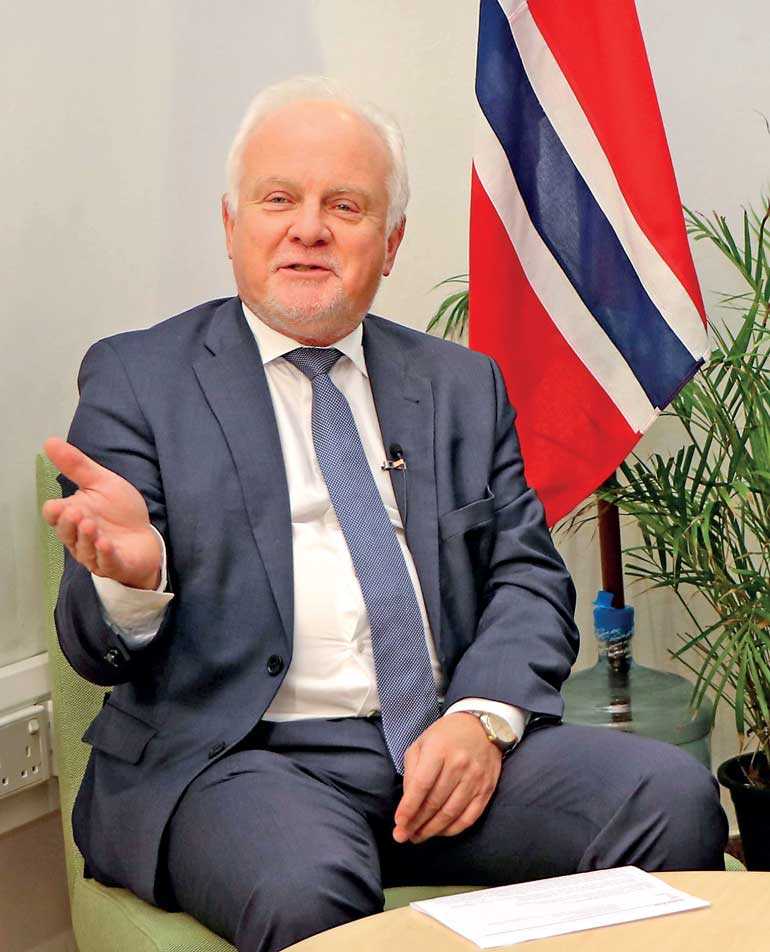
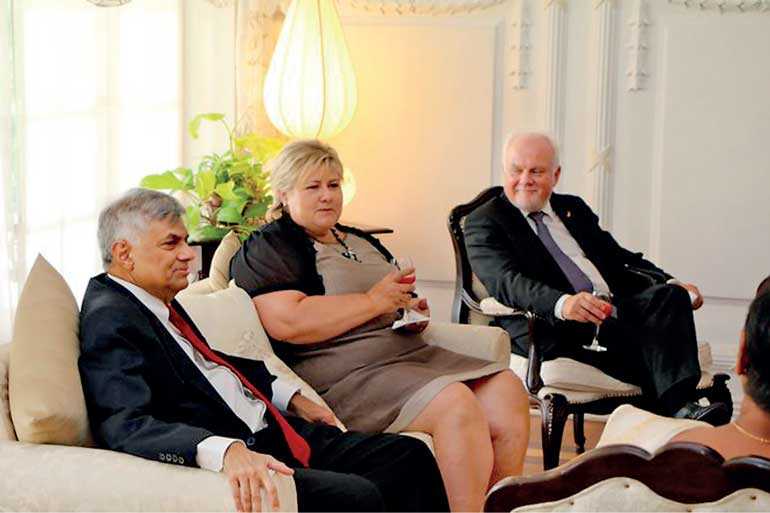
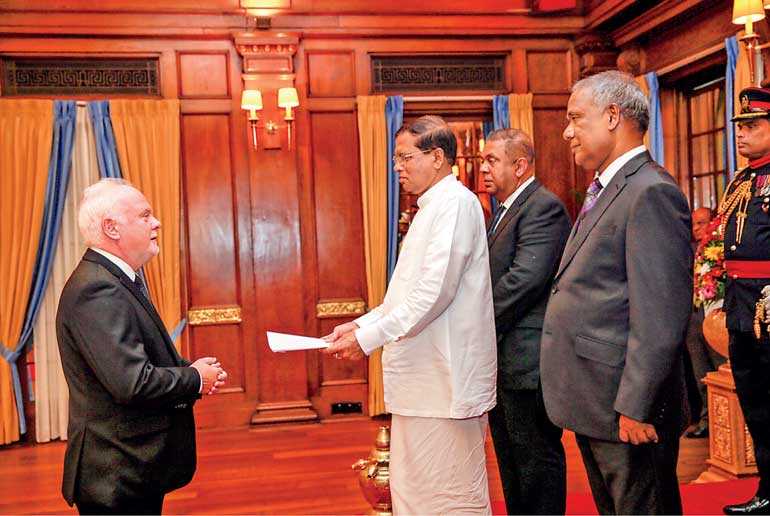
The amiable Ambassador of Norway Thorbjørn Gaustadsæther this month
completes his four-year tenure in Sri Lanka. During his stint the bilateral ties between Sri Lanka and Norway reached a new high. In this exclusive interview with the Daily FT, Ambassador Gaustadsæther recaps some of the recent key initiatives to further the bilateral cooperation and their outcomes. He also shares what the
opportunities are going forward for greater bilateral partnerships and how Sri Lanka could meet its own challenges and aspirations. Here are excerpts:
By Nisthar Cassim
Q: How would you describe the current state of bilateral ties between Norway and Sri Lanka?
Bilateral ties between Norway and Sri Lanka are at an all-time high. We have had several high-level bilateral visits in the recent years.
During the visit of State Minister Marianne Hagen in March this year, Norway extended around $ 7 million assistance for demining activities in Sri Lanka to achieve its goal to be landmine free by 2020. Last year, the Norwegian Research Vessel Dr. Fridtjof Nansen visited Sri Lanka to conduct an eco-system survey on Sri Lanka’s coastal waters. 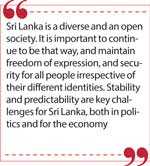
In addition to our strong political ties, we also work closely with the Fisheries Ministry and also support UNDP and ILO in Sri Lanka, among a host of local NGOs.
On the business side, a number of Sri Lankan IT companies work with Norwegian businesses and we also have a close partnership with SLASSCOM.
In people-to-people relations, last year around 15,000 Norwegians visited Sri Lanka. This year so far we’ve had around 8,000 Norwegians visit Sri Lanka in the first six months. Considering that Norway is a small country of only five million people, that is a substantial figure. There is also an increase in the number of Sri Lankans visiting Norway and the Scandinavian region, so I think tourism and people-to-people ties are heading in the right direction.
Q: What have been the new focus areas of cooperation?
At present Norway’s bilateral relations with Sri Lanka focus on four key areas. On the political side, we focus on strengthening political cooperation on issues of mutual interest, and supporting peace, justice and strong institutions. As small countries in the global playing field, Norway considers it important for both Sri Lanka and Norway to support the United Nations and a rules-based international order. We also focus on cooperating on matters of mutual interest; for example, both Norway and Sri Lanka have signed the Mine Ban Treaty, and we are assisting Sri Lanka to achieve its goal to be mine free by 2020.
Economic and sustainable development through development assistance including technical cooperation, and private sector cooperation are our other key focus areas.
We focus on providing assistance where we have special capacity and expertise and where there are special needs in Sri Lanka. 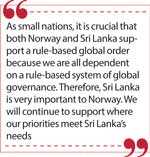
Since 2009, Norway has assisted Sri Lanka in the work of national reconciliation, democratisation and strengthening of human rights. Norway’s assistance focused on reconstruction and resettlement in the conflict-affected areas in the north and east, support for reconciliation, good governance, democratisation, women and gender equality and technical assistance.
In 2017, more than 1500 vulnerable families in conflict-affected areas in the north received support from Norway through ILO and UNDP to establish viable livelihood activities. We are also working closely with UNDP Sri Lanka on their flagship portfolio on Sustainable Development Goal 16 focusing on Peace, Justice and Strong institutions.
As Norway has expertise on fisheries, there is also increased cooperation in the fisheries sector by providing technical assistance to the Ministry of Fisheries for commercialisation of the aquaculture sector, and technical cooperation between Norway’s Institute of Marine Research and NARA (National Aquatic Resources Research and Development Agency). However, I must say that Norway’s bilateral support in the fisheries sector goes way back to the 1960s.
The Norwegian Geotechnical Institute (NGI) cooperates with the National Building Research Organization (NBRO) on warning systems and mapping of landslides and sinkholes, which is also of great importance considering the natural disasters we have seen in the recent years.
In addition to all these, Norway also supports a number of local NGOs and civil society organisations for their work on anti-corruption, good governance, free press, the right to information, legal counselling for women, increased political participation of women, and prevention of violence against women and other marginalised communities as well as economic cooperation.
Business development is also a priority in Norway’s relations with Sri Lanka. The embassy assists Norwegian companies that want to invest in Sri Lanka by providing them advice and by linking them up with local actors.
Q: Can you highlight some of the key initiatives taken in the past few years to strengthen bilateral ties?
While Norway and Sri Lanka work together on a number of areas, I believe one of the key initiatives that we took to strengthen Norway-Sri Lanka ties in the past few years was organising several high-level bilateral visits.
In 2016 when the then Norwegian Foreign Minister Børge Brende visited Sri Lanka, that was the first visit of a Norwegian Foreign Minister to Sri Lanka in 11 years after the peace process. Then we had the Prime Minister of Norway Erna Solberg visit Sri Lanka later in 2016. Last year, the Prime Minister of Sri Lanka Ranil Wickremesinghe visited Norway. 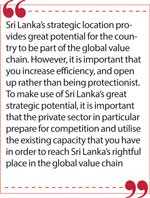
The former Sri Lankan Foreign Minister Mangala Samaraweera also visited Norway in 2016. In 2018, State Secretary Jens Frølich Holte visited Sri Lanka in conjunction with the visit by the Norwegian research vessel Dr. Fridjof Nansen.
We also had former Fisheries Minister Mahinda Amaraweera visit Norway. Most recently, our State Minister Marianne Hagen visited Sri Lanka. These visits are clear indications of the political will from both our Governments to work together, and they pave the way for increased bilateral cooperation in numerous areas.
Q: What would you single out as the most important achievement/initiative in SL-Norway relations during your tenure as the Ambassador?
During my tenure here in Sri Lanka from 2015 to now, it was those high-level visits that were the most important achievement for Norway-Sri Lanka relations.
Those visits also resulted in many positive outcomes, such as committing our contribution to demining activities in Sri Lanka, and supporting Sri Lanka with the ecosystem survey on coastal waters at the request of the Sri Lankan authorities.
Q: How important is Sri Lanka for Norway and in your view how can Sri Lanka benefit from Norway?
Sri Lanka is important to Norway. Our two countries have had close development cooperation from the 1960s. When we look at the big picture, both Norway and Sri Lanka are small countries. It is important for small countries like ours to work together to achieve our goals and cooperate and support each other at multi-lateral fora.
As small nations, it is crucial that both Norway and Sri Lanka support a rule-based global order because we are all dependent on a rule-based system of global governance. Therefore, Sri Lanka is very important to Norway.
Q: What new measures can both countries take to further strengthen ties?
Firstly, In addition to being small states, Norway and Sri Lanka are also ocean states, meaning we are both surrounded by the ocean and heavily depend on the ocean. The oceans have a lot of potential, but many resources in the sea are not yet discovered. There is a drive internationally to use more ocean resources, but you need to use it in such a way that you do not deplete it. That is one area to strengthen our ties.
Secondly, a lot of transport today is done by vessels. If we can make the maritime sector and our sea transport sector use clean energy, that would be great. In Norway, we have ships running on wind and battery power now. There is also research done on how to use less fuel, how to develop sustainable tourism, to have clean beaches and get rid of litter. So, in this area of blue economy, there is much that Norway could share with Sri Lanka to further strengthen our ties for a cleaner, greener, better ocean and a planet. Thirdly, I must say, our strength is in the maritime, marine and energy sectors together with Information Communication Technology. We are doing our utmost to promote these sectors to Sri Lankan partners and connect Norwegian and Sri Lankan businesses.
Q: In your opinion what are the key socio-economic and political challenges for Sri Lanka at present and how can Norway help as a development partner?
Sri Lanka is a diverse and an open society. It is important to continue to be that way, and maintain freedom of expression and security for all people, irrespective of their different identities. Stability and predictability are key challenges for Sri Lanka, both in politics and for the economy.
Especially for a country like Sri Lanka, it is important to attract foreign investments. While the final decision to make an investment lies with the individual investor, governments should do what is required to attract investments through the right policies like fiscal discipline, and predictable tax regimes.
As a development partner, Norway continues to assist Sri Lanka. In 2018, Norway extended a total of NOK 55.4 million (approximately $ 6.3 million) for projects on economic development and trade, good governance, health and social services, environment and energy and education sectors.
We will continue to support where our priorities meet Sri Lanka’s needs.
Q: Any advice you would like to share with Sri Lanka’s private sector?
Sri Lanka’s strategic location provides great potential for the country to be part of the global value chain. However, it is important that you increase efficiency, and open up rather than being protectionist.
To make use of Sri Lanka’s great strategic potential, it is important that the private sector in particular prepare for competition and utilise the existing capacity that you have in order to reach Sri Lanka’s rightful place in the global value chain.
Q: What would you like Sri Lanka to be in five or 10 years’ time?
As it is, Sri Lanka is an open society with good interaction with the outside world. In another five to 10 years, I would like Sri Lankan society to be even more open, which will attract more private investments and more tourists to this beautiful island. I would also like Sri Lanka to continue to be a place where people of diverse identities live together in harmony and reaching their full potential.
Q: What will remain as most memorable for you in your personal life when it comes to Sri Lanka?
My four-year tenure in Sri Lanka has been an interesting experience, which gave me a taste of South Asia. I was privileged to enjoy the rich diversity of the people, culture, nature and scenery of this beautiful island.
I must also say that as a diplomat, I felt more included in society while interacting with people. Sri Lanka was definitely one of the more open and welcoming places that I have been in.